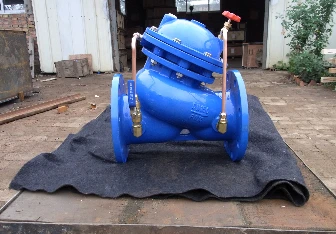nov . 10, 2024 10:48 Back to list
Different Varieties of Check Valves Used in Water Systems
Types of Check Valves for Water
Check valves play a crucial role in various piping systems, especially in water management and distribution. These valves are designed to prevent backflow, ensuring that water or other liquids flow in only one direction. The variety of check valves available caters to different operational requirements and environments. This article explores several common types of check valves used in water systems.
1. Swing Check Valves
Swing check valves are among the most prevalent types used in water systems. They operate using a hinged disc that swings open with the flow of water. Once the flow stops or reverses, the disc swings back to its original position, effectively blocking any potential backflow. Swing check valves are ideal for high-flow applications and are commonly used in water treatment facilities and irrigation systems. However, they are not suited for applications involving low flow rates, as they may not close properly.
2. Ball Check Valves
As the name suggests, ball check valves use a spherical ball that acts as the closure mechanism. The ball is held against a seat by gravity or pressure from the fluid. When water flows in the correct direction, the ball rises, allowing passage; when the flow reverses, the ball drops back into the seat, sealing the valve. Ball check valves are particularly useful in applications where a tight seal is required to prevent any reverse flow, such as in water supply lines. Their compact design also makes them easy to install in various systems.
types of check valves for water

Lift check valves are similar in operation to the swing check valves but use a disc that lifts from its seat rather than swinging. These valves can handle both horizontal and vertical installations, making them versatile for different piping applications. The lift check valve ensures minimal pressure drop, which is beneficial in systems where maintaining pressure is crucial. These valves are commonly found in pumps and boiler applications.
4. Diaphragm Check Valves
Diaphragm check valves utilize a flexible diaphragm that opens and closes in response to the pressure changes in the flow. When water flows in the correct direction, the diaphragm flexes to allow passage. On the other hand, if there is any backflow, the diaphragm seals against the valve body to prevent reverse flow. These valves are especially effective in applications requiring a high level of sanitation and are used in food processing and water purification systems. Their ability to handle varying fluids with different characteristics makes them a valuable choice.
5. Slanted Seat Check Valves
Slanted seat check valves feature a seat that is angled, allowing for a smoother flow path and reducing turbulence within the system. This design minimizes pressure losses and enhances flow efficiency. Slanted-seat check valves are often used in large water distribution systems and industrial applications. Their unique design helps reduce the likelihood of abrasion and wear, extending the valve’s lifespan.
Conclusion
Understanding the different types of check valves is essential for selecting the right one for specific applications in water systems. Each type of check valve has its unique engineering advantages and suitable use cases. Whether for preventing backflow in treatment facilities or maintaining pressure in supply lines, selecting the appropriate check valve not only ensures the efficiency of the system but also enhances reliability and durability. When planning or upgrading water management systems, careful consideration of check valve types can lead to improved performance and extended system life.
-
Why Metric Trapezoidal Thread is Ideal for Precision Motion ControlNewsAug.05,2025
-
The Unique Properties of a Block of Granite for Industrial UseNewsAug.05,2025
-
The Role of Flanged Y Strainers in Preventing Pipeline ClogsNewsAug.05,2025
-
The Importance of Regular Calibration for Master Ring GagesNewsAug.05,2025
-
How a Cast Iron Surface Table Enhances Accuracy in ManufacturingNewsAug.05,2025
-
Comparing Different Check Valve Types for Optimal Flow ControlNewsAug.05,2025
Related PRODUCTS









